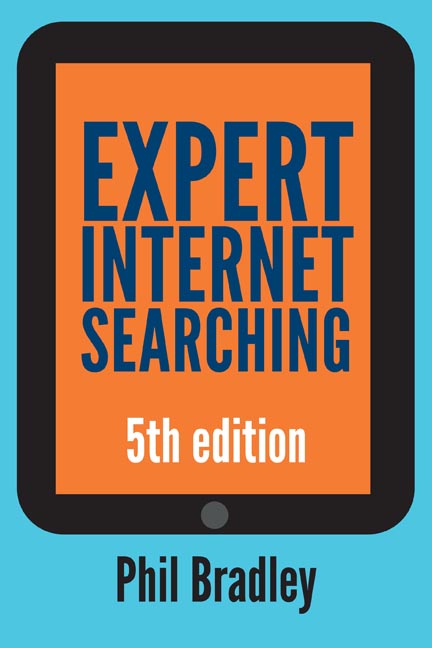Book contents
- Frontmatter
- Contents
- List of figures
- Preface
- Acknowledgements
- 1 An introduction to the internet
- 2 An introduction to search engines
- 3 The world according to Google
- 4 Other free-text search engines
- 5 Directory, clustering and similarity search engines
- 6 Multi- and meta-search engines
- 7 Social media search engines
- 8 Visual and image search engines
- 9 People-based resources
- 10 News-based search engines
- 11 Multimedia search engines
- 12 Specialised search engines
- 13 Hints, tips and the future
- Index
3 - The world according to Google
Published online by Cambridge University Press: 09 June 2018
- Frontmatter
- Contents
- List of figures
- Preface
- Acknowledgements
- 1 An introduction to the internet
- 2 An introduction to search engines
- 3 The world according to Google
- 4 Other free-text search engines
- 5 Directory, clustering and similarity search engines
- 6 Multi- and meta-search engines
- 7 Social media search engines
- 8 Visual and image search engines
- 9 People-based resources
- 10 News-based search engines
- 11 Multimedia search engines
- 12 Specialised search engines
- 13 Hints, tips and the future
- Index
Summary
Introduction
It may seem a ridiculous thought, but at one point in time it was possible to write a book about internet search and not include any references to Google, though you'd need to go back to the first edition of this book, written at the end of the last century, to find it. The rise of Google has been unstoppable, and it would be quite easy to just write about the search engine and the company behind it for chapter after chapter. A search on Amazon for ‘Google’ results in over 650,000 items for sale (up from 50,000 in 2013) and covers books, apps, videos, mobile phones, hardware and software. Google stopped being just a search engine many years ago, and is now involved in an increasing number of ventures from mobile phones to cloud computing to consumer services and more. It's the world's most dominant search engine, indexes trillions of pages and is searched billions of times every day. In August 2015 Google announced plans to reorganise all of its different interests into an overarching company called Alphabet.
Its success is mirrored by its failures, however. It has tried several times to enter the social networking environ ment to take on Facebook, but each of these attempts has met either with complete failure, with Google Wave and Google Buzz, or very limited success, with Google+. Google glasses failed to take off, despite all of the hype surrounding them. It's also had its fair share of failures in the software field as well, and closes down almost as many projects as reach fruition.
Did you know?
The number of searches performed by Google each year isn't known, but it's at least 2 trillion (http://searchengineland.com/google-now-handles-2-999- trillion-searches-per-year-250247).
I've called this chapter ‘The world according to Google’ because it's very easy to spend your entire internet working life just using its various products and because of the way in which it tries to ‘mould’ its search results to you it's all too easy to limit what you do and see to these results.
- Type
- Chapter
- Information
- Expert Internet Searching , pp. 37 - 68Publisher: FacetPrint publication year: 2017



